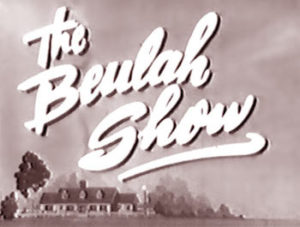
*On this date in 1950, The Beulah Show was broadcast for the first time. This was the first American television situation comedy to star a Black person.
The Beulah Show ran on the radio from 1945 to 1954. The Beulah TV shows ran concurrently on ABC for three seasons, Tuesday nights until September 22, 1953. Beulah was a housekeeper and cook for the Henderson family: father Harry, mother Alice, and son Donnie. Most of the comedy in the series is derived from the fact that Beulah, referred to as "the queen of the kitchen," could solve the problems that her white employers could not figure out. Other characters include Beulah's boyfriend, Bill Jackson, a handyman constantly proposing marriage, and Oreo, “acting white,” a puzzled maid for the family next door.
Originally portrayed by white actor Marlin Hurt, Beulah appeared in the early 1940s as a supporting character on the popular Fibber McGee and Molly radio series. In 1945, Beulah was spun off into her radio show, The Marlin Hurt and Beulah Show, with Hurt still in the role. After he died of a heart attack in 1946, he was replaced by another white actor, Bob Corley, and the series was renamed The Beulah Show.
Black actress Hattie McDaniel took over the role in 1947, continuing in The Beulah Show until she became ill in 1952 and was replaced by Lillian Randolph, who was replaced for the 1953-1954 radio season by her sister Amanda Randolph. In 1950, Roland Reed Productions modified it into a TV situation comedy for ABC, with Ethel Waters in the title role until 1952. McDaniel, Louise Beavers, Butterfly McQueen, and Ruby Dandridge were used.
The show for TV was directed from time to time by Richard L. Bare and Abby Berlin. Beulah was canceled at the end of the 1952-1953 seasons. From there, black characters, in effect, disappeared from television, with only small and occasional roles surfacing. The next television program to star a Black woman in the title role would be Julia in 1968, starring Diahann Carroll.